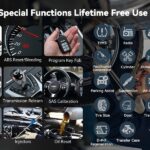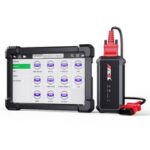For car enthusiasts and everyday drivers alike, understanding your vehicle’s health is becoming increasingly accessible. Enter the ELM327 OBD2 Bluetooth adapter, a small but powerful tool that connects your car to your smartphone or tablet, unlocking a wealth of diagnostic data. These adapters, compatible with various apps, allow you to read error codes, monitor engine performance, and gain insights into your car’s inner workings. However, with numerous options available, selecting the right ELM327 V2.1 OBD2 Bluetooth adapter can be confusing. This guide will navigate you through the essentials, ensuring you choose a quality adapter that meets your needs and avoids common pitfalls.
Understanding ELM327 OBD2 Adapters
To appreciate the significance of an ELM327 V2.1 OBD2 Bluetooth adapter, it’s crucial to understand the underlying technologies.
What is OBD2?
OBD2, or On-Board Diagnostics II, is a standardized system implemented in most cars manufactured after 1996. It provides access to various vehicle subsystems, primarily the engine and emissions control systems. Through a standardized port, mechanics and now individuals can retrieve diagnostic trouble codes (DTCs) and real-time data to diagnose issues and monitor performance.
What is ELM327?
ELM327 is a microcontroller chip widely used in OBD2 adapters. It acts as a translator between your vehicle’s complex communication protocols and your user-friendly devices like smartphones and computers. Essentially, the ELM327 chip processes the raw data from your car’s OBD2 port and converts it into a format that apps can understand and display. While “V2.1” is often mentioned, it’s important to note that version numbers on many generic adapters are often misleading and don’t necessarily indicate quality or features. Focusing on the functionality and reliability of the adapter is more critical than solely relying on a version number.
Why Bluetooth?
Bluetooth connectivity provides a wireless bridge between the ELM327 OBD2 adapter plugged into your car’s OBD2 port and your smartphone or tablet. This wireless connection offers convenience, allowing you to monitor data in real-time without cumbersome cables. Bluetooth has become the dominant connection type for these adapters due to its ease of use and broad compatibility with mobile devices.
Types of ELM327 Bluetooth Adapters and Connection
When selecting an ELM327 OBD2 Bluetooth adapter, understanding the different Bluetooth types is crucial, especially concerning compatibility with your smartphone operating system.
Classic Bluetooth (Versions 1.x, 2.x, 3.x)
Classic Bluetooth is the traditional and widely supported Bluetooth standard. Many Android devices work flawlessly with ELM327 adapters using classic Bluetooth. These adapters are generally reliable for Android users and offer good data transfer speeds suitable for most diagnostic tasks.
Bluetooth Low Energy (BLE or Bluetooth LE, Version 4.0 and above)
Bluetooth Low Energy (BLE) is a more power-efficient version of Bluetooth. Crucially, iOS devices (iPhones and iPads) primarily require Bluetooth LE, Wi-Fi, or Bluetooth MFi adapters for OBD2 connectivity due to Apple’s operating system restrictions on classic Bluetooth for generic OBD2 devices. For iOS users, choosing a Bluetooth LE ELM327 adapter is often the most straightforward and recommended approach.
Bluetooth MFi
Bluetooth MFi (Made for iPhone/iPad/iPod) is classic Bluetooth technology, but specifically certified by Apple. Adapters with MFi certification are guaranteed to work with iOS devices using classic Bluetooth. However, these adapters are typically more expensive because manufacturers need to comply with Apple’s certification process. Examples include OBDLink MX+ and vLinker FS.
Wi-Fi Adapters
While less common for Bluetooth-centric searches, Wi-Fi ELM327 adapters exist. These create a direct Wi-Fi network to connect with your device. While compatible with both Android and iOS, Wi-Fi adapters can sometimes be less convenient as they may interfere with your mobile device’s internet connection and can be more complex to set up. For most users seeking ease of use and reliable connectivity, Bluetooth, especially Bluetooth LE for iOS, is generally preferred over Wi-Fi.
Compatibility with Operating Systems: iOS vs. Android
Operating system compatibility is a primary consideration when choosing your ELM327 OBD2 Bluetooth adapter.
Apple iOS (iPhone/iPad)
Apple’s iOS ecosystem has specific requirements. Classic Bluetooth ELM327 adapters (versions 1.x, 2.x, 3.x) are NOT compatible with iPhones or iPads for OBD2 functionalities due to iOS limitations. Therefore, for iOS devices, you must choose between:
- Bluetooth LE (4.0 and above) ELM327 Adapters: These are generally the most recommended for iOS. They offer a balance of ease of connection, acceptable data speed, and availability.
- Bluetooth MFi ELM327 Adapters: These offer classic Bluetooth connectivity with iOS compatibility but come at a premium price. They are suitable for users needing maximum speed and guaranteed iOS compatibility.
- Wi-Fi ELM327 Adapters: While they work with iOS, they can present connection complexities and are less user-friendly than Bluetooth LE options for most users.
For iOS users, Bluetooth LE ELM327 adapters like OBDLink CX or Vgate iCar Pro BLE are often the best choices.
Google Android
Android devices offer broader compatibility. They generally support:
- Classic Bluetooth (versions 1.x, 2.x, 3.x) ELM327 Adapters: These are widely used and recommended for Android due to their reliability and faster data transfer speeds compared to Bluetooth LE in some scenarios. For most Android users, a classic Bluetooth ELM327 adapter is a solid choice.
- Bluetooth LE (4.0 and above) ELM327 Adapters: Android also supports Bluetooth LE adapters. While they might be slightly slower than classic Bluetooth in some cases, they still function correctly.
- Wi-Fi ELM327 Adapters: Android devices are also compatible with Wi-Fi adapters, but as mentioned earlier, Bluetooth is often more convenient.
For Android users, classic Bluetooth ELM327 adapters are typically recommended for their speed and reliability. However, Bluetooth LE adapters will also function.
Quality Matters: Avoiding “Bad” ELM327 Adapters
Beyond connection type, the quality of your ELM327 OBD2 Bluetooth adapter is paramount. The market is unfortunately saturated with low-quality adapters that can cause various issues. Forget outdated notions about specific chip versions or board counts; focus on real-world performance and reliability.
Common Problems with Low-Quality ELM327 Adapters:
- Complete Non-Functionality: Some adapters simply do not work at all.
- Unstable Operation: Adapters may freeze, spontaneously reboot, fail under temperature changes or humidity, or work intermittently. Connection may be inconsistent, working one day and failing the next, or showing partial data.
- Incomplete Command Support: “Bad” adapters may claim to support all ELM327 commands but only implement a subset, limiting diagnostic capabilities.
- Fixed ECU Address Issues: Some are hard-coded to only communicate with a specific ECU address, preventing access to other control units in your car.
- Data Length Limitations: They may have restrictions on the length of data requests and responses, hindering comprehensive diagnostics.
- Data Loss: Adapters may drop data packets during transmission, resulting in incomplete or corrupted data.
- Data Corruption: Worse still, they can distort data, potentially sending incorrect commands to your car’s systems, which is dangerous, especially when attempting to write data to the ECU.
- Partial Protocol Support: Adapters might only support a limited number of OBD2 communication protocols. If your car uses an unsupported protocol, the adapter will be useless for your vehicle, even if it works on another car.
- On-Board Network Interference: Low-quality adapters can send junk data or requests onto your car’s network, interfering with the ECU’s normal operation and potentially causing engine roughness or other issues.
- Critical Issues with Advanced Functions: If you intend to use your adapter for “Coding and Service” functions (writing data to the ECU), a high-quality adapter is absolutely essential. A faulty adapter can lead to data corruption during write operations, potentially causing severe damage to your car’s electronic systems.
The market is unfortunately flooded with “bad” adapters. Investing in a reputable, quality ELM327 OBD2 Bluetooth adapter is crucial to avoid these problems and ensure safe and reliable car diagnostics.
Recommended ELM327 OBD2 Bluetooth Adapters
Based on user feedback and expert reviews, here are some recommended ELM327 OBD2 Bluetooth adapters, categorized roughly from most expensive to more affordable options:
-
OBDLink MX+ with Bluetooth MFi (#ad link): Premium, top-of-the-line adapter. Compatible with both iOS and Android. Offers Bluetooth MFi for guaranteed iOS compatibility and excellent performance. Higher price point but worth it for advanced users.
-
OBDLink CX with Bluetooth LE (#ad link): High-performance Bluetooth LE adapter, ideal for iOS and Android. Known for its large memory buffer and fast data throughput. Excellent choice for iOS users seeking a reliable and fast Bluetooth LE option.
-
vLinker Devices: vLinker has emerged as a reputable brand offering quality ELM327 adapters. Consider these options:
- vLinker MC+ with Bluetooth LE (#ad link): Bluetooth LE, compatible with iOS and Android. A well-regarded, reliable Bluetooth LE option.
- vLinker FS with Bluetooth MFi (#ad link): Bluetooth MFi for iOS and classic Bluetooth for Android. Offers MFi certification for iOS users who prefer classic Bluetooth connectivity.
- vLinker MS with Bluetooth MFi: Another MFi option from vLinker, aiming to compete with OBDLink. Firmware updates have improved its performance, making it a worthy contender.
For Android, vLinker MC+ or any vLinker classic Bluetooth adapter is recommended. For iOS, vLinker MC+, vLinker FS, or vLinker MS are excellent choices. Always check for firmware updates from the manufacturer for optimal performance.
-
Vgate iCar Pro BLE (#ad link): A popular and versatile adapter with both Bluetooth 2.0 and Bluetooth 4.0 chips, ensuring compatibility with iOS, Android, and Windows. Firmware updates are crucial, especially for older versions, to ensure proper CAN Extended addressing support for certain car brands like Toyota and BMW. Ensure your Vgate iCar Pro BLE has firmware version 4.1.02 (2021/01/08) or later.
-
Vgate iCar Pro 2S: The successor to the iCar Pro BLE, offering improved performance. If choosing between the two, the iCar Pro 2S is the better option.
ELM327 OBD2 Adapters to Avoid
To help you steer clear of problematic adapters, here is a list of ELM327 OBD2 Bluetooth adapters and types to generally avoid:
- xTool Adapters: These are not ELM327 compatible and are designed to work only with xTool’s proprietary software.
- Wired Adapters (USB, COM): Car Scanner and many modern OBD2 apps primarily support wireless Bluetooth or Wi-Fi adapters. Wired adapters are generally not compatible.
- “Mini” Adapters: Adapters with “mini” in their name are overwhelmingly likely to be low-quality. Avoid them.
- Extremely Cheap Adapters: If the price seems too good to be true, it probably is. Very cheap adapters are often plagued with quality issues.
- Adapters with Bluetooth MAC Addresses Starting with 11:22:33 or 00:00:00: These MAC addresses are indicators of generic, often low-quality clones.
- KONNWEI Devices (Recent Production): While previously recommended, recent KONNWEI adapters have shown a decline in quality and are prone to data loss.
- “Micro Mechanic” Adapters: Many users report these adapters failing after short usage periods.
- “THINMI.COM” Adapters: Known for limited ELM327 command support and frequent fake responses.
- “KUULAA” Brand Adapters: Generally considered unreliable.
- Adapters with This Design (Generic Clones): Avoid adapters that visually resemble these common, low-quality designs:
Conclusion
Choosing the right ELM327 V2.1 OBD2 Bluetooth adapter is crucial for a positive car diagnostic experience. Prioritize quality over price and be mindful of operating system compatibility, particularly for iOS devices. By understanding the types of adapters, potential pitfalls, and recommended models, you can confidently select an ELM327 OBD2 Bluetooth adapter that will reliably unlock your car’s diagnostic data and empower you to better understand and maintain your vehicle. Opting for a recommended adapter from reputable brands like OBDLink or vLinker is a wise investment for reliable and safe car diagnostics.
Disclaimer: As an Amazon Associate, I earn from qualifying purchases through the affiliate links provided in this article.


